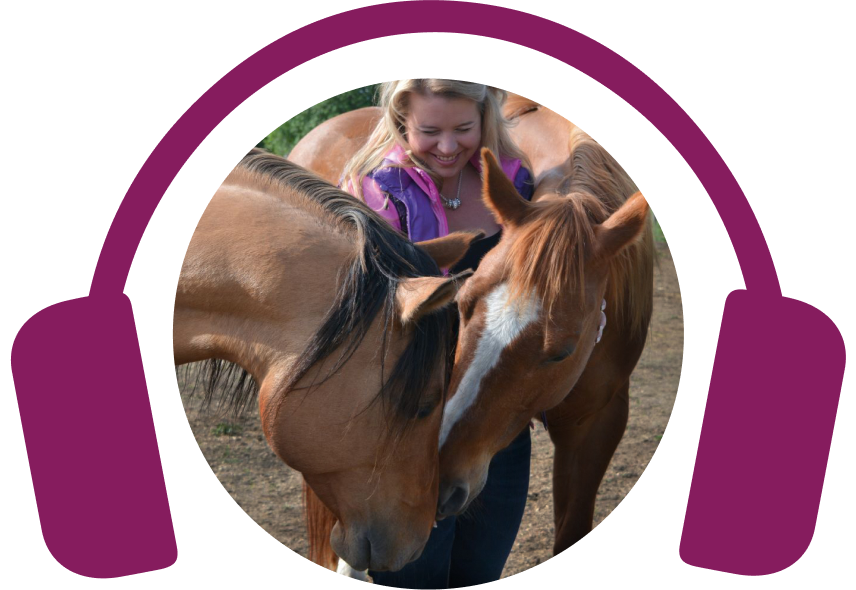Elisha’s Podcast
ELISHA’S PODCAST

Ready to get your horses on the path to better health?
This podcast was created to do just that.
Tune in to get new insights, perspectives, horse health tips, and real-life horse healing stories.
Take what you learn and apply it to your horse TODAY.

One Conversation at a time
From learning what to feed your horse and how to use nutrition effectively, to practicing prevention and approaching specific health challenges naturally, to just bringing your horse more joy and better health…
I’ve got you covered!

Check out my recent episodes
Horses should love their food because it is important to them. However, many horse owners struggle to determine whether their horse's diet provides enough nutrition or if something in their food could be causing them problems. So, I have identified seven signs indicating your horse may be ready for a food change. One of the biggest challenges for horse owners is determining when their horse needs a diet change. Many owners struggle to assess whether their horse is getting enough nutrition or if there could be a problem with their diet. To simplify that, owners must look for signs indicating a change is required. It could mean adding certain essential nutrients or removing any ingredients causing intolerances or digestive issues. Metabolic horses, particularly those with insulin resistance or equine metabolic syndrome (EMS), often show signs of excessive hunger. Those horses may be aggressive around food, constantly searching for more due to fluctuating blood sugar levels. Stabilizing their blood sugar through appropriate dietary adjustments can significantly improve their satiety and behavior around food. If your horse plays with its food, tips the dish over, or walks away, it might be a sign they dislike something in their diet. Horses are food-motivated, and when disinterested, it could indicate a food intolerance or a taste preference. A process of elimination can help owners identify the offending item. A change in their attitude toward food can be a sign of improvement. Horses that eagerly run to their owners for food without showing indifference are likely enjoying the diet and experiencing positive health benefits. This shift can indicate that the current nutrition plan is working. Behaviors like cribbing or wind-sucking after eating can signal digestive discomfort. That may be linked to certain ingredients in the diet, like high levels of alfalfa or feeds with many additives. Removing the problematic items and supporting digestion with proper nutrients can alleviate those behaviors. If a horse starts eating manure, dirt, or other non-food items, it may be searching for missing nutrients or trying to soothe its indigestion. Changing their food and perhaps introducing probiotics can help resolve that behavior. Chronic digestive issues like diarrhea, fecal water syndrome, ulcers, and colic often indicate dietary problems. Feeding the wrong types of hay, such as coarse hay or straw, or giving a diet too high in sugars can cause bloating, distension, and gut discomfort. Adjusting the diet to include more suitable hay and reducing sugars can help resolve these issues. If the health condition of a horse does not improve despite lifestyle and supplement changes, it may be due to something in their feed. In such cases, stripping down the diet to just hay and water for a short period may reveal whether the food may have been the issue. Many commercial feeds contain similar ingredients that may aggravate the condition if not properly reviewed. Understanding the dietary needs of your horse does not have to be complicated. Horses thrive on simplicity and variety, so focus on keeping their diet straightforward. Avoid overloading their meals with too many ingredients, and observe their behavior as you make changes. By keeping things simple and observing their responses, you can improve their health and happiness through a well-balanced, tailored diet. Connect with Elisha Edwards on her website Join my email list to be notified about new podcast releases and upcoming webinars. Free Webinar Masterclass: Four Steps to Solving Equine Metabolic Syndrome Naturally Register for Resolving Equine Metabolic Syndrome Naturally, now. We are exploring muscle testing for horses today. Muscle testing is an alternative tool that is gaining popularity in equine care. You can use it to determine the best remedies for your horse and to formulate a personalized program tailored to its specific requirements. Muscle testing, also known as applied kinesiology or autonomic response therapy, has been gaining popularity in human and animal health practices. Applied kinesiology can be confused with the academic study of kinesiology, which focuses on human movement. However, muscle testing is a distinct diagnostic tool rooted in chiropractic care used to identify imbalances in the body. Muscle testing has evolved into a safe and non-invasive diagnostic tool to identify blocks in the energy field surrounding the body, pinpoint specific problems, and provide insights into the course of diseases. It can be helpful to assess food allergies, nutrient deficiencies, and emotional imbalances in humans and animals. Muscle testing relies on quantum physics. Human and animal bodies are composed of particles and waves, with the electromagnetic field being a fundamental aspect that influences how energy flows through and around the body. The electromagnetic field and biophotons (light particles in DNA) play crucial roles in cellular communication and strengthening how energy fields impact overall health. Incoherent energy fields can weaken the organism, making it harder for healing to occur. Practitioners aim to align those fields to enhance the natural healing processes within the body. You can apply different muscle testing techniques to assess imbalances and deficiencies within the body. You can use the muscle strength of a surrogate, which involves creating a biofeedback circuit with another person, or the sway method, where you observe how the body moves. You can also use the ring method or the pendulum method to tap into the energy field surrounding the body. For those new to muscle testing, it may be helpful to begin working with a partner or more experienced practitioner to build confidence and skill in interpreting results accurately. The healing process starts with the intention of the practitioner. The energy fields of the practitioner and the horse interact, influencing the outcomes. So practitioners and horse owners must maintain high energy and positive intentions as they can significantly affect healing processes. Effective muscle testing requires a deep understanding of equine health, nutrients, and conditions. Practitioners should remain open and free from preconceived notions, as biases can skew results. Trusting the diagnostic tool and being receptive to unexpected outcomes is crucial for accurate assessments and effective treatment plans. Over time, I have learned to trust that muscle testing will lead me in the right direction, even when I do not fully understand the results. Sometimes, it takes a few months to see how test outcomes align with historical issues or emotional changes of a horse. It is essential to remain patient and trust the process, as understanding often comes with time. Try not to let your personal beliefs or past experiences influence your muscle testing results. If a particular approach does not work, it is okay to reassess and try a different strategy. The goal is to stay objective and open-minded throughout the process. I have training programs available for anyone who wants to delve deeper into muscle testing. My signature program, Healing Horses Their Way, is designed to provide a solid foundation of knowledge before diving into muscle testing. It starts in late February or early March each year. After completing the foundational course, you can join me for a more advanced group where I explore muscle testing in greater depth. It includes practical, live events where you can apply your skills with real horses. I will announce the registration dates in the next few months. Connect with Elisha Edwards on her website Join my email list to be notified about new podcast releases and upcoming webinars. Free Webinar Masterclass: Four Steps to Solving Equine Metabolic Syndrome Naturally Register for Resolving Equine Metabolic Syndrome Naturally, now This week, we are focusing on the benefits of chaste berry. Chaste berry is an herb that ties right into our recent podcasts on the effects of PPID (Cushing’s Syndrome) or hormonal imbalances, as it often gets mentioned in the context of those issues for horses. Chaste berry, derived from the chaste tree, is also known by its Latin name, Vitexagnus-castus. When searching for this supplement in stores, it may also be labeledVitex. Both names are commonly used, including in homeopathic versions. Chaste berry contains various medicinal compounds, including flavonoids, glycosides, organic acids, alkaloids, essential oils, and sterols. Those ingredients work synergistically, providing a more balanced and effective treatment in whole-plant form than isolated compounds. Chaste berry is available in several forms, like tinctures, whole berries, and capsules. It is used for treating hormonal imbalances in horses and often gets used for human health, particularly for regulating hormones related to PMS and menopause. For horses, it is better to use the whole plant due to the broad spectrum of its active ingredients. Chaste berry is known for its effects on dopamine-producing cells and the pituitary gland, making it particularly useful for managing horses with PPID (Cushing's disease). It helps regulate various hormones, although its effects are more about balancing rather than increasing or decreasing particular hormone levels. Chaste berry, like other adaptogens, including ashwagandha and licorice root, helps regulate hormone levels rather than targeting a specific hormone. That regulation is helpful for horses with symptoms of irritability and reproductive issues, which could indicate a hormonal imbalance. Chaste berry is also a beneficial herb for managing symptoms related to PMS, menopause, and possibly even infertility in mares. Its ability to balance estrogenand progesterone levels can alleviate mood changes, irritability, and other hormonal symptoms in mares. Always consult with a veterinarian or a qualified herbal practitioner before introducing any new herb to ensure that it is safe and will not cause unintended side effects in your horse when combined with other medications. While chase berry can be effective, it should not be used simultaneously with other medicines that target the same pathways, as it might enhance or diminish their effects or even lead to adverse reactions. Chaste berry has shown many beneficial effects on horses with advanced hormonal issues-particularly when used as a tincture for a more concentrated dose. Even though chaste berry has improved symptoms like shedding patterns and overall vitality in older horses with PPID, always be cautious when using it and monitor its effectiveness. Connect with Elisha Edwards on her website Join my email list to be notified about new podcast releases and upcoming webinars. Free Webinar Masterclass: Four Steps to Solving Equine Metabolic Syndrome Naturally Register for Resolving Equine Metabolic Syndrome Naturally, nowRecognizing the Need for a Food Change
Excessive Hunger and Food Possessiveness
Lack of Interest in Food
No Motivation to Approach
Unusual BehaviorAfter Eating
Eating Inedible Items
Digestive Problems
Health Problems Not Improving
Conclusion
Links and resources:
An Introduction to Muscle Testing
Evolution and Application
Quantum Physics and Electromagnetic Fields
Energy and Frequency
Exploring Different Methods
The Role of Intention and Energy
Knowledge and Openness
Trusting the Process
Avoiding Personal Bias
Training Opportunities
Advanced Learning
Links and resources:
Origin and Identification of Chase Berry
Medicinal Components and Synergistic Effects
Forms and Uses of Chaste Berry
Chaste Berry and PPID in Horses
Hormonal Regulation and Adaptogens
Benefits Beyond PPID
Usage Caution with Medications
Practical Application and Case Studies
Links and resources:
Meet your host
Hi there, I’m Elisha Edwards

Meet your host
Hi there, I’m Elisha Edwards
I have helped guide thousands of horses back to good health over the years from a variety of different health challenges. And through my courses, webinars, and speaking engagements I educate and empower horse owner’s from around the world to take charge of their horse’s health using the holistic model of health care.
So I know first-hand how difficult and overwhelming it can be to navigate all the different opinions and conflicting information that you come across especially when your horse is faced with a health problem. In many cases, the journey is just as hard on the owners as it is on the horses.
I started Healing Horses with Elisha to guide you, support you, and encourage you through the process of prevention and recovery so you feel good about the decisions you’re making for them.
Here’s what I believe
I have seen countless horses with seemingly impossible health conditions that have been resolved so easily with the right combination of diet, nutrition, and natural remedies. In many cases, it is not the health conditions that prevents the horse from recovering, it is the lack of education, resources, and options that are available.
If the insight and information you gain from this podcast gives you some newfound hope or inspires you to take
a new approach then it has served it’s purpose.
Thank you for giving me the opportunity to help you improve your horse’s health.
Keep listening and learning. Your horse is worth it.
Listen Now
Tune in wherever you listen to your podcasts and follow me so you never miss an episode. I release a new one every Tuesday!

Leave a Review
Reviews help me reach more horses and also help me deliver more relevant content to you!

What my Listeners are saying
“Every time I think there is no way to top what you do – you elevate us to yet another level. I wish I had a fraction of your communication skills. You’re amazing and I am so grateful to be apart of the magic you are creating for horses and their humans.”
Tracey
“Your podcasts are fantastic! I get so excited to listen to the next one. I have 6 geriatric horses and your podcast has really opened my mind to new possibilities in their health and given me the strength to help them through hiccups in their well-being the past few months. I have a nursing education and you explain pathology better than my university professors.”
Sharon
“I can’t thank you enough for the Mindset Tips podcast. I really needed this reminder. It was just what I needed to hear to today.”



